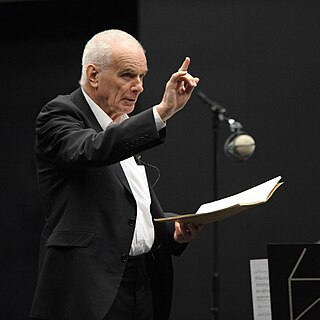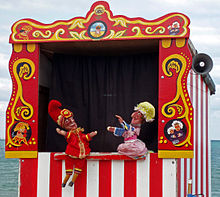
Sir Harrison Birtwistle was an English composer of contemporary classical music best known for his operas, often based on mythological subjects. Among his many compositions, his better known works include The Triumph of Time (1972) and the operas The Mask of Orpheus (1986), Gawain (1991), and The Minotaur (2008). The last of these was ranked by music critics at The Guardian in 2019 as the third-best piece of the 21st century. Even his compositions that were not written for the stage often showed a theatrical approach. A performance of his saxophone concerto Panic during the BBC's Last Night of the Proms caused "national notoriety". He received many international awards and honorary degrees.

A pit orchestra is a type of orchestra that accompanies performers in musicals, operas, ballets, and other shows involving music. The terms was also used for orchestras accompanying silent movies when more than a piano was used. In performances of operas and ballets, the pit orchestra is typically similar in size to a symphony orchestra, though it may contain smaller string and brass sections, depending upon the piece. Such orchestras may vary in size from approximately 30 musicians to as many as 90–100 musicians. However, because of financial, spatial, and volume concerns, current musical theatre pit orchestras are considerably smaller.
Alice Anne LeBaron is a United States composer and harpist.

Robin Greville Holloway is an English composer, academic and writer.
Where the Wild Things Are, Op. 20, is a fantasy opera in one act, nine scenes, by Oliver Knussen to a libretto by Maurice Sendak, based on Sendak's own 1963 children's book of the same title. Knussen composed the music from 1979 to 1983, on commission from the Opèra National, Brussels.

Gawain is an opera with music by Harrison Birtwistle to a libretto by David Harsent. The story is based on the Middle English romance Sir Gawain and the Green Knight. The opera was a commission from the Royal Opera House, London, where it was first performed on 30 May 1991. Rhian Samuel has published a detailed analysis of the opera. Birtwistle revised it in 1994, and the premiere of the revised version was given at the Royal Opera House on 20 April 1994.
Philip Grange is an English composer and academic.
The Scarecrow, an opera, premiered at the University of Texas at Austin in February–March 2006. The music was written by Joseph Turrin and libretto by Bernard Stambler. The opera is based on Percy MacKaye's play, which was in turn based on Nathaniel Hawthorne's last short story, “Feathertop.”

The Second Mrs Kong is an opera in two acts, with music by Sir Harrison Birtwistle to a libretto by Russell Hoban. Glyndebourne Touring Opera first staged the opera on 24 October 1994. The cast included Philip Langridge, Helen Field and Michael Chance. Tom Cairns designed and directed the production, in collaboration with choreographer Aletta Collins. Elgar Howarth was the conductor. This production was recorded for the National Video Archive of Performance by the V&A Theatre Museum. This recording is available to view by appointment at the V&A Collections Centre and Reading Room in Olympia, London.

The Last Supper is an opera with music by Sir Harrison Birtwistle to an English and Latin libretto by Robin Blaser. Birtwistle composed the music over the period written in 1998-1999. The world premiere was given by the Berlin State Opera on 18 April 2000, with the production directed by Martin Duncan and conducted by Daniel Barenboim. It was subsequently performed by the Glyndebourne Touring Opera in October/November 2000 and the following summer at the 2001 Glyndebourne Festival. Many of the original cast returned for two concert performances at the Piccolo Teatro Studio Expo, Milan and the Teatro Valdocco, Turin on 4–5 September 2008 with the London Sinfonietta, conducted by Elgar Howarth as part of the Settembre Musica festival.
Raymond Yiu, born 1973; is a composer, conductor, jazz pianist and music writer.
Family Opera Initiative (FOI) is an American opera company based in New York City that commissions, develops, and premieres original works for cross-generational audiences. It was founded in 1995 by Grethe Barrett Holby, originally as part of American Opera Projects. Its mission was and remains to create new repertory for family audiences, to bring the experience of opera to a diverse audience, and to engage the community in the process and performance of their works.

Twice Through the Heart is a musical work by the English composer Mark-Anthony Turnage, variously described as a dramatic scena, as a monodrama, as a song cycle, as a chamber opera or even as a "dramatic song-cycle-cum-scena". It is scored for mezzo-soprano and 16 instrumentalists and sets an English-language libretto by the Scottish poet Jackie Kay based on her script for a television programme about a woman jailed for killing her violent husband.

The Symphony No. 5 was composed by Peter Maxwell Davies in 1994 on commission from the Philharmonia Orchestra, who gave the world premiere under the composer's direction at a BBC Promenade concert on 9 August 1994 at the Royal Albert Hall in London.

The Corridor is a chamber opera composed by Harrison Birtwistle to an English language libretto by David Harsent. It premiered at the Aldeburgh Festival on 12 June 2009. The title refers to the corridor through which Orpheus and Eurydice passed as he was leading her from the underworld.
Elizabeth Atherton is a British lyric soprano. Born and brought up in London, she is the daughter of conductor David Atherton. She studied at Trinity College, Cambridge and at the Royal Scottish Academy of Music and Drama with Patricia MacMahon. She is a winner of the Maggie Teyte Prize and the Handel Singing Competition.
Joseph Phibbs is an English composer of orchestral, choral and chamber music. He has also composed for theatre, both in the UK and Japan. Since 1998 he has written regularly to commissions for Festivals, for private sponsors, and for the BBC, which has broadcast premieres of his orchestral and chamber works from the Proms and elsewhere. His works have been given premieres in Europe, the United States and the Far East, and he has received prestigious awards, including most recently a British Composer Award, and a Library of Congress Serge Koussevitzky Music Foundation Award. Many of his works have been premiered by leading international musicians, including Dame Evelyn Glennie, Esa-Pekka Salonen, Leonard Slatkin, Sakari Oramo, Vasily Petrenko, Gianandrea Noseda, and the Belcea Quartet.
Michael Barrie Gordon Anderson, known as Barry Anderson, was a New Zealand-born composer, teacher, and pioneer in the dissemination of electroacoustic music in the United Kingdom. Internationally, his best-known work is his realisation of the electronic music for Harrison Harrison Birtwistle's opera The Mask of Orpheus.
Stephen Lawrence Pruslin was an American pianist and librettist who relocated to London in the 1970s to work with Peter Maxwell Davies and Harrison Birtwistle.






